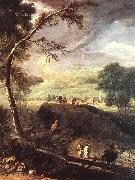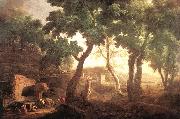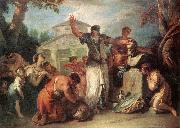|
Here are all the paintings of RICCI, Marco 01
| ID |
Painting |
Oil Pantings, Sorted from A to Z |
Painting Description |
| 85104 |
 |
Classical capriccio of Rome |
oil on canvas, 77 x 135.2 cm
cyf |
| 8906 |
 |
Coastal View with Tower |
1715-20
Oil on canvas, 106,7 x 148,6 cm
Private collection |
| 8909 |
 |
Landscape with River and Figures (detail) |
c. 1720
Oil on canvas
Gallerie dell'Accademia, Venice |
| 8908 |
 |
Landscape with River and Figures df |
c. 1720
Oil on canvas, 136 x 197 cm
Gallerie dell'Accademia, Venice |
| 41173 |
 |
Landscape with Washerwomen |
mk157
c.1720
Oil on canvas
136x198cm
|
| 8910 |
 |
Landscape with Washerwomen fdu |
c. 1720
Oil on canvas, 136 x 198 cm
Gallerie dell'Accademia, Venice |
| 8907 |
 |
Landscape with Watering Horses |
c. 1720
Oil on canvas, 136 x 198 cm
Gallerie dell'Accademia, Venice |
| 51997 |
 |
Sacrifice to Silenus |
c. 1723
Oil on canvas,
56,5 x 73,5 cm |
|
|
| RICCI, Marco
|
| Italian Painter, 1676-1730
Painter, printmaker and stage designer, nephew of (1) Sebastiano Ricci. He probably began his career in Venice in the late 1690s as his uncle's pupil, concentrating on history paintings (untraced). Having murdered a gondolier in a tavern brawl, he fled to Split in Dalmatia, where he remained for four years and was apprenticed to a landscape painter (Temanza, 1738). Once back in Venice (c. 1700) he put this training to use in painting theatrical scenery. Little is known about his early development, and it remains difficult to establish a chronology for his work. A group of restless, romantic landscapes (examples, Leeds, Temple Newsam House; Padua, Mus. Civ.), painted with lively, free strokes and formerly thought to represent his early period, have now been convincingly attributed (Moretti) to Antonio Marini (1668-1725). His earliest dated works, a tempera painting, View with Classical Ruins (1702; priv. col.), and a Landscape with Fishermen (1703; ex-Kupferstichkab., Berlin; untraced), are serene and classical, close in style to tempera paintings generally dated 1710-30. This suggests that Ricci's style did not develop much, and that strong classicizing tendencies,
|
|

